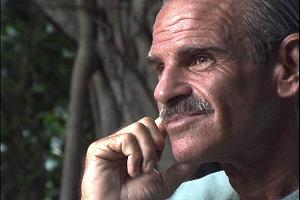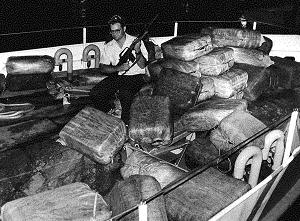Cocaine Cowobys


A few months ago, theaters saw the awful retread of Miami Vice. Before that, there was the television series and Scarface. Both were based on the real-life Cocaine Wars in the late 70s and early 80 in Miami. In this case, real life is far more interesting (especially than the dreary Michael Mann movie), as directed by Billy Corben. Corben takes years of information and three primary interviewees, all involved directly in the industry, and weaves together a taut, compelling story worth of any action movie. Cocaine Cowboys moves briskly over its two-hour running time, providing a wealth of information without boring its viewer.
Part of this is because of who Corben interviewed. Of course he interviewed local television reporters and law enforcement. These people provide the background and show how they were eventually able to turn the tide of the war. However, it is the bad guys who make the film fascinating. Mickey Munday was the first American step in a complicated chain of events. He owned the planes and boats that picked up cocaine from the Medellin cartel in Columbia. At the height of his business, he owned planes, boats, and towing companies, all part of an elaborate game to hide from the authorities. The next step was Jon Roberts, a nightclub owner from New York who took the drugs from Munday and sold them to wholesalers. Finally, Jorge "Rivi" Ayala, a later entrant in the wars. He was the favored enforcer of Griselda Blanco, the person primarily responsible for the escalation in violence in the war.
Part of this is because of who Corben interviewed. Of course he interviewed local television reporters and law enforcement. These people provide the background and show how they were eventually able to turn the tide of the war. However, it is the bad guys who make the film fascinating. Mickey Munday was the first American step in a complicated chain of events. He owned the planes and boats that picked up cocaine from the Medellin cartel in Columbia. At the height of his business, he owned planes, boats, and towing companies, all part of an elaborate game to hide from the authorities. The next step was Jon Roberts, a nightclub owner from New York who took the drugs from Munday and sold them to wholesalers. Finally, Jorge "Rivi" Ayala, a later entrant in the wars. He was the favored enforcer of Griselda Blanco, the person primarily responsible for the escalation in violence in the war.
Munday and Roberts stumbled into cocaine as a way to make more money than pot. There was an overabundance of marijuana in the marketplace, and cocaine was the hot new commodity. Both saw a dramatic and immediate increase in profit with cocaine, as well as a user base eager for more. Cocaine was the hot new drug, and the Columbians had a limitless supply available to those they could trust. For the next few years, Roberts and Munday became richer and richer as their market increased. Both are extremely savvy, and knew that a low profile was good for their business. Both are also well spoken, which makes listening to them gripping. Life was good for them until everything changed with the emergence of Blanco.
Blanco's presence is what changes Cocaine Cowboys from an interesting documentary to a fascinating one. Blanco was flashy, psychotic, and easily angered. Through Ayala and other enforcers, she executed those who committed minor transgressions against her. Roberts and his other partners were extremely nervous about her, since she cared little about their carefully cultivated low profile. A bloodbath ensues, and Corben chronicles the power plays of the drug lords and the attempts of the authorities to capture them. When real life is as exciting as this, who needs scripted movie?